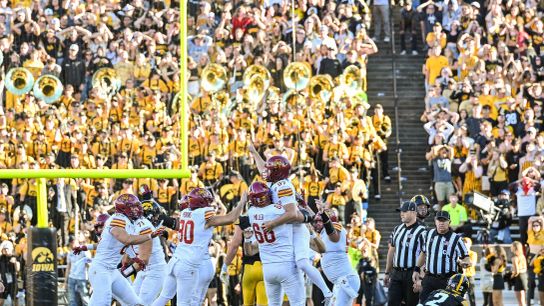College football has always run on a decentralized power structure, a series of nation-states rather than one unified government. The beginning of the COVID-19 pandemic led many people to believe that would change, at least for this year. Conferences would work together. The Power 5 commissioners spoke every day, we were told.
In reality, the sport's decision-making process has never been more fractured than ever. The Big Ten surprised the rest of the sport by canceling its non-conference schedule on July 9, the day after the Ivy League pushed its season to the spring. The Pac-12 followed suit a day later.
Three weeks later, Big 12 schools are adding non-conference games.
Not only that, the Big 12 is adding games against the exact type of programs the Big Ten and Pac-12 are specifically avoiding.
Kansas added a game against Southern Illinois this past Saturday, to be played on Aug. 29. Oklahoma is so committed to playing its previously scheduled game with Missouri State that it was moved up a week, from Sept. 5 to Aug. 29. (The NCAA on Tuesday granted a blanket waiver to any program looking to move a Week 1 game to Week 0.)
“As we researched options for replacing our cancelled opening game, we received recommendations from our medical professionals, reviewed the opportunity with our campus leaders, and looked regionally for a quality opponent,” Kansas AD Jeff Long said. “Importantly, Southern Illinois agreed to follow the Big 12 testing protocols once they have been finalized. SIU provides us a challenge as we open the 2020 season.”
On Tuesday, Iowa State added a Sept. 12 game with Ball State, replacing the canceled rivalry game with Iowa. (Ball State was supposed to play at Michigan.)
Iowa State's press release stressed not the status of the rapidly-approaching season but... the competitive advantage of getting an eighth home game.
"I am excited for our players and fans to have eight opportunities to play in Jack Trice Stadium this fall," AD Jamie Pollard said. "Playing our first four games and six of the opening eight at home should give our team a significant competitive advantage."
As other conferences push back the start of their seasons, the Big 12 is among those working to push theirs closer. The conference has yet to make an official statement on the season, but it's hard to imagine these ADs scheduling games without assurance from their presidents that all this effort wouldn't be in vain.
Heck, Les Miles statement on Saturday emphasized the fact that scheduling SIU game allowed his Jayhawks to push the start of training camp up, to July 31 -- this Friday.
“We are excited for the opportunity to start fall camp practices on July 31st and prepare to take on a good Southern Illinois football team,” he said.
As we sit here on the last Tuesday of July, most conferences in the NCAA have pushed their seasons to the spring, or at least to late September. This, the thinking goes, allows more time for the curve to flatten and players to be at less of a risk of catching the virus. The downside of a compressed schedule is that you have less room to move things around if and when that becomes a necessity.
The Big 12 has, apparently, taken the opposite strategy. By stretching the season out -- the conference title game could be pushed back a week or two -- the conference has more room to postpone and/or reschedule games.
Months from now, we'll know which strategy proved to be the best for attempting to play football during a global pandemic -- because college football will have tried all of them.
